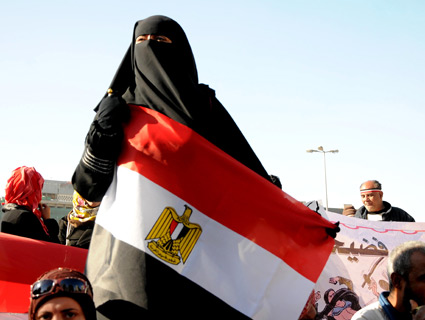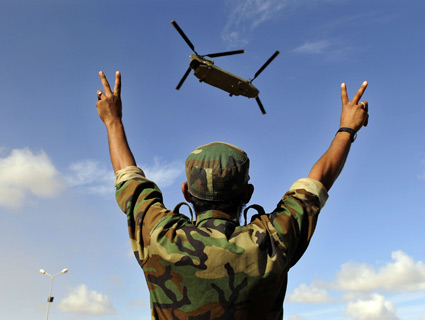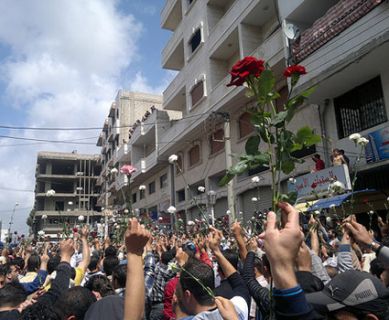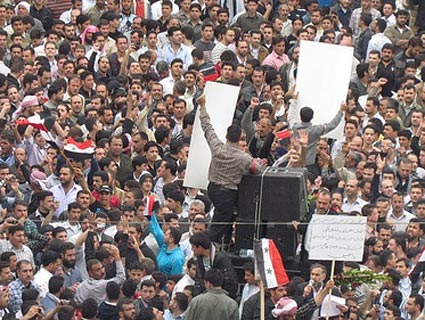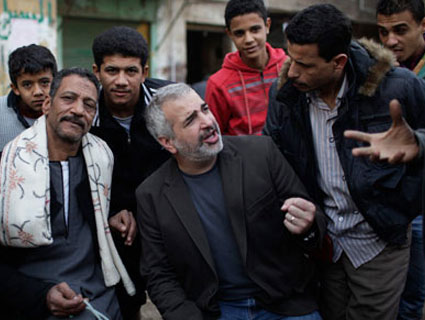
Shadid in Egypt, holding forth.AnthonyShadid.com
[Update, Feb. 16: Tragic news: Anthony Shadid died Thursday while reporting for the New York Times inside Syria. The apparent cause was an asthma attack. He was 43. He didn’t live to see the upcoming release of his latest book, House of Stone, a subject of this interview published on Jan. 26.]
Anthony Shadid may have a hard time topping his last year’s adventures. The New York Times’ Beirut bureau chief and two-time Pulitzer Prize winner for international reporting spent 2011 tracing the path of the Arab Spring. He traveled west from Egypt, where he covered the 18-day uprising that toppled strongman Hosni Mubarak, to Libya, where demonstrations against dictator Moammar Qaddafi morphed into armed rebellion. During a battle last March in the eastern city of Ajdabiya, Shadid and three Times colleagues were captured by Libyan government forces. Over the course of a harrowing week, they were blindfolded, beaten, and threatened with execution before finally being released. Returning to Lebanon in August to report on the Assad regime’s intensifying crackdown on Syria’s protest movement, Shadid audaciously snuck across the Syrian border sans visa. For days he shuttled on motorcycle from one safe house to the next alongside some of the country’s most wanted dissidents, emerging with a rare firsthand glimpse of a nation cascading toward civil war.
Despite his renown for daredevil reporting—in 2002, Shadid was wounded by sniper fire in Ramallah—it’s his knack for penetrating the surface of rough-and-tumble conflict zones that makes him one of his generation’s preeminent foreign correspondents. In his more than six years covering the Iraq War, he routinely unearthed the conflict’s human faces with a lyricism that seemed to belie his prolificacy.
Shadid’s third book, House of Stone, due out in late March, demonstrates his uncanny ability to reclaim humanity from wreckage. It recounts Shadid’s return to his ancestral village in southern Lebanon from 2007 to 2008 to rebuild his great-grandfather’s abandoned home—and perhaps piece back together his own wayward life in the process. In an account infused with introspection, the Oklahoma-raised Shadid narrates a rich personal odyssey for community amid a war-torn region’s struggle to reclaim a modicum of its former identity. I spoke to Shadid about the Arab Spring, the perils of his profession, and the path forward in Syria.
Mother Jones: What was it like growing up Lebanese in Oklahoma City?
Anthony Shadid: I had a great childhood. I think writers are always better off when they have more twisted childhoods, but I didn’t. There’s always a sense of community, of belonging to the Lebanese community, in Oklahoma. It’s remarkable, when I talk to other Arab-Americans, how closed and tight-knit the community was, everything from the church that everyone shared—they all came from the same town in Lebanon—to the food that was served on every holiday and almost every day. There was a sense of coming from someplace else and having to make it in the place they ended up, and there was a lot of pride in that. The one thing that shaped my life was when I was 15 or 16: I knew I wanted to be a journalist. And not just a journalist, but a journalist in the Middle East, and to go back to the Arab world and try to understand what it meant to be Lebanese.
MJ: What resonated with you the most as you researched your family’s history for the book?
AS: I didn’t know a lot about my great-grandfather who built the house, and I’d done interviews 20 years ago, even before I went to college. I started doing some interviews with elderly people in the family because I knew they would pass away and we would lose the power of their story. But I saw a certain resonance with my grandfather’s life and the decisions that he had to make in terms of his career and his family, in terms of sending his kids away. The more I learned about him, the more I understood him.
MJ: You write that some people in Marjayoun weren’t too happy about a past story you’d penned about the town. How do you think your book will be received?
AS: [Laughs.] I have no idea. I’m actually building a fence around the house right now because I’m worried the reception might not be all that great. I think people will understand what the town represents and what the town means, and be very proud of the book. I’ve tried to offer a memorial to what Marjayoun is and what it was and hopefully what it can still be. But, it’s a town, and a town is filled with gossip and rivalries and jealousies. I don’t think the reception is going to be universally the one I would’ve hoped for.
MJ: So how do you determine which stories are worth risking your life for?
AS: I’ve struggled with that question a lot. I don’t think there’s any story worth dying for, but I do think there are stories worth taking risks for. What’s so regrettable to me about Ajdabiya [where Shadid was kidnapped] was that I didn’t feel like that story was worth taking that risk for, and I was too late in understanding that, and at great cost: the cost of our driver’s life. That’s something that all four of us have to live with. I took great risks when I went into Syria illegally and without a visa. That was probably one of the greatest risks I’ve ever taken as a journalist, but that story felt as if it wouldn’t be told if I didn’t go there. That’s the arithmetic that I usually rely on. And those events in Syria over the summer were seismic. It’s a decision that’s a lot easier to make in hindsight. Emotion and, hopefully not, but ambition often get in the way of the judgment. But you go and hope you get it right.
MJ: Did your kidnapping just a few months earlier weigh heavily on your mind when you decided to sneak into Syria?
AS: It did. And I was scared, to be frank. In the back of my mind, I was wondering whether I was being foolish, whether I was being rash. In the end, it worked out all right, but I think any risk you’re going to take like that you need to have that in the back of your mind.
MJ: Speaking of Syria, the Arab League just announced a timetable for a transition, within months, to free elections. Will that change the calculus on the ground at all?
AS: There aren’t a lot of options out there. There aren’t a lot of mechanisms for diplomatic pressure. And I think this is a gesture that kind of highlights that. They’ve put this out there as another means of trying to force the situation. But how you deliver on something like this is very unclear.
MJ: Can you think of anything that might break the current stalemate between government and opposition forces?
AS: I think there are two trends out there that may shift the situation. One is the economy. You just have to look at the exchange rate right now of the Syrian pound. It’s shifting rapidly. I think it’s up to as much as 75 to the dollar when it used to be 47. That is very clearly going to create a lot of pressure on people first and foremost, but also on the government. The second thing is the balance of forces on the ground. If you look at towns like Zabadani or Duma—I don’t want to say it’s a situation like Hama last summer, where the city was in some ways liberated and Syrian forces were withdrawn—but I think you’re seeing instances today where local residents are able to keep the forces of the government out, however temporarily. And I think that’s something to watch very closely.
MJ: Is there an imminent possibility of full-blown civil war?
AS: Absolutely. Some things that suggest a civil war are well in place. But we have to consider where those forces would be aligned. I don’t think the sheer demographics of a sectarian conflict lend themselves to a prolonged civil war. In other words, the Alawites [Assad’s sect] are vastly outnumbered. They remain the backbone of this regime, but they just doesn’t have the numbers or, I think, the determination to fight a protracted civil war there.
MJ: What are some of the possible endgames?
AS: I think we’ll see something very bloody, very chaotic, with a fracturing of both opposition and the government, and a conflict that’s really hard to discern—a conflict in which it’s easy to see multiple parties rather than two parties trying to slug it out. Who knows? It’s always the unexpected that determines events. Just look at the way it’s played out up to this point.
MJ: Can you envision circumstances in which there’s a foreign intervention?
AS: It’s really hard to imagine for me. It’s going to be used as a form of pressure, as a warning, but I think foreign intervention would be a dramatic step in a region that’s very combustible. The very combustibility of this region makes that unlikely.
MJ: You said you went into Syria last year because you didn’t feel the story would be told otherwise. How much of it is getting told now?
AS: More now because more journalists are getting in. That’s for sure. Journalism is always the art of the incomplete. You get bits and pieces. And I think we’re getting more bits and pieces at this point than we were, say, a year ago.
MJ: Is it frustrating to be on the outside looking in?
AS: Yeah, absolutely. I’m desperately looking for a visa. It’s not coming. So far. As a reporter, you want to write about what’s happening in front of you and to not have it happen in front of you is frustrating.
MJ: So what do we know about the Middle East now that we didn’t know a year ago?
AS: I’m not sure we know anything, to be honest with you. It’s still so early. When we talk about the Arab Spring, we’re talking about a region that has for so long lived under the boot of dictatorship, in which civil societies have been obliterated, in which freedom of expression is subversive. And what I saw in Tahrir Square was the counterexample of that. And what I also saw in Syria, in Hama, where for a short period the security forces had withdrawn. Just for the span of a few weeks, in a society that had been ruled by dictatorship for four decades—where there’s hardly any civil society, where there’s no sense of opposition that’s viable—we saw an idea of self-determination as society began to rule itself. That was remarkable to me, just how resilient these societies actually are even after these incredibly withering few generations of oppression. What we’ve seen is the movement against, which is represented by the revolts, but what we’re beginning to see coalesce are the movements for. And what for represents is much more ambiguous.
MJ: So, should we fear the Islamists?
AS: I think what we’re starting to see is the fruition of those trends that began even as early as the 1980s with [Rached] Ghannouchi [in Tunisia], but also in the 1990s with the Wasat Party in Egypt and changes in the Muslim Brotherhood in the decade after. These societies are on the verge of trying to strike some deal in which political Islam forcefully enters the mainstream and becomes a part of the body politic. I think that will yield a healthier society even as the cleavages sharpen between secular and religious, between mainstream Islamists and Salafists. But I think this is going to be a process that all these societies are going have to go through. How the West deals with it, I think, is a much different question. The West’s reaction has tended much more toward anxiety, unease. And in some ways, for this reckoning between political Islam and these societies to succeed, you’re going to need a change in mind—almost a paradigm shift within the West—over how they look at political Islam and whether they can embrace political Islam to try to make this experiment succeed.
MJ: Your discussion of the Levant in House of Stone contains a sense of almost irreversible loss.
AS: In some ways, the history of the Middle East in the last century has been a history of borders—borders that were drawn on the map, often by imperial whim, but also borders in terms of mentalities, as our notions of identity have shrunk. Whatever we thought of those ideologies that held sway a generation ago—say Arab nationalism, communism, Syrian nationalism—they’ve lost their vitality. In their wake, they’ve left smaller identities where we identify ourselves first and foremost by religion and faith. You see a shift from inclusive ideologies to exclusive notions of identity. And that has made for a much smaller Arab world, a much less cosmopolitan Arab world. Marjayoun is a great example: The town itself, which was once very vibrant politically, has become much more affiliated with this simpler, almost visceral, notion of being Christian. And that’s a recurring theme you hear from people in Marjayoun and from other Christians in the Arab world—that when we identify ourselves first and foremost as a minority, we’re almost setting the stage for eventual extinction. Minorities in and of themselves become imbued with a sense of powerlessness.
MJ: Why do you think Lebanon hasn’t experienced the same upheaval as its neighbors?
AS: Proponents of the Lebanese system would say you have a greater degree of freedom of expression here. You have more a sense of individual rights—and that’s not necessarily because of an enlightened government but by virtue of a weak state. Critics, though, would say you’re not dealing with one dictator but many dictators, and these sectarian leaders who play on fears of insecurity keep a stranglehold over the political system in Lebanon. So because they’re so numerous it’s much harder to rally the country against one leader or one source of oppression. I don’t think Lebanon has avoided the Arab Spring because it’s an enlightened place; I think it’s avoided the Arab Spring because the critical mass of how you oppose such an ingrained system with power so diffuse remains unclear.
MJ: Are you more or less optimistic about the Middle East the more you report on it?
AS: I came out of Iraq very pessimistic and dejected in some ways. Egypt, I think, was an antidote; watching what happened with the revolution was quite inspirational. At least what you see now is that there’s a chance for redemption in the region, and that kind of keeps you going as a journalist. What I think you see in so many of these situations are the shades of gray. The more we get away from that either/or, the better I think we understand these countries and the region as a whole. It’s hard to get away from the fact that, whatever you call it—East versus West, America versus the Arab World—these two regions have been in conflict at least for my generation. So in any kind of conflict, you have a certain dehumanization that comes along with it. And it’s important as a reporter, a writer, a journalist, to try to restore humanity.
MJ: You’ve spent a lot of time documenting violent events in godforsaken places. How did you find writing this book, which is much more personal?
AS: I found it difficult. As a journalist, your job is to bear witness, and this book is in part a memoir. It wasn’t easy. It was definitely a different style of writing. On the flip side, I enjoy covering the Arab world, I’ve spent my entire career here in the Middle East, but I would never call myself a war correspondent. The region I want to cover is beset by conflict and that’s regrettable, but it forces me to cover it. Being in Marjayoun for a year, especially coming out of the war in Lebanon in 2006, I was doing what I wanted to do, and that was make sense of society, of people’s lives—very much with the threat of war but in a moment where war didn’t dictate everything that was going on.
MJ: You write in the book about the toll your job has taken on your personal life and your family. Do you have any regrets?
AS: There are a lot of careers you could say that about, but I think especially in journalism trying to balance your personal and professional life is endlessly frustrating. At the end of that war in 2006, I felt the cost of that more than I ever had. My marriage had fallen apart, I was away from my daughter, and I really didn’t have a sense of having a home. And that was what was so important about being in Marjayoun and rebuilding the home. At its most elemental, it was about trying to find home, and in the end, I did. It sounds like propaganda for the book, but it’s actually not. I now consider that house in Marjayoun—how do I put this?—it’s the place where I end up when I’m looking for home.
